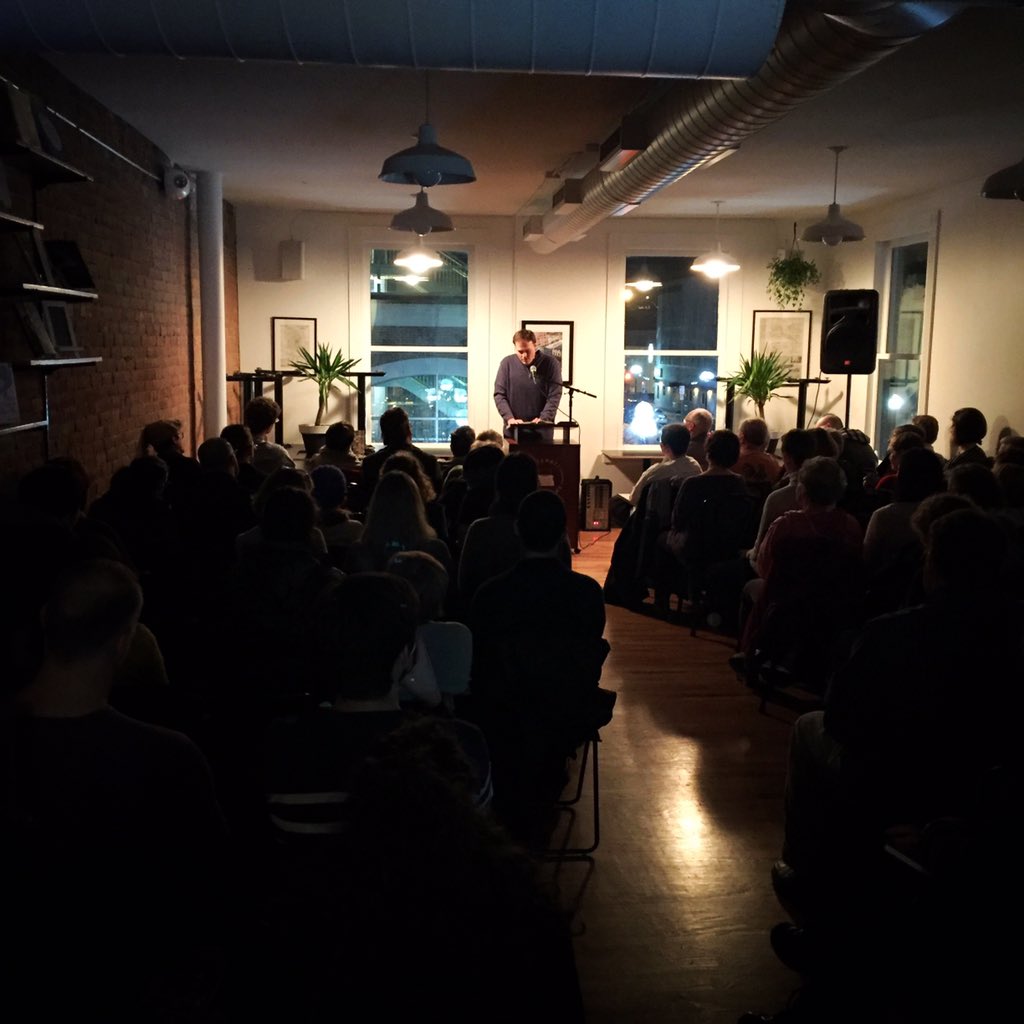
“A city without a bookstore is a city without a soul.” Garth Greenwell used to teach in Ann Arbor, several years ago, during the unfortunate period between the closing of Borders and the opening of Literati, when there was no place for to buy new books in Ann Arbor and even in the rest of the country, it seemed a desperate time for the bookstore. He started his reading by talking a bit about coming back here (including a shout-out to his former students in the audience) and expressing his joy that a place like Literati had sprung up in the city.
The reading was underway shortly. He opened with a scene between Mitko and the main character, the latter asking questions about the former, attempting to shift his way through Mitko’s past. There was Bulgarian vocabulary here and there, which Greenwell would stop to expand upon the word and why it was used. There was something jilted in the way he would pause to explain, as if the word had caught him off-guard, like someone else had slipped it in there. Although this was obviously not his first reading (he had previously done rounds for his novella Mitko), there was still something in these stops and in his demeanor that made it seem like he was still getting used to this. It’s most noticeable in his body language–and perhaps it is just how he always is–but he has this way of folding in on himself. There’s a hunch in the back, a slope to the shoulders, a tucking in of the chin, and not to mention the slightest of sways–it might be nervousness, or maybe it’s just a general anxious energy, it’s hard to discern the difference here.
But, whatever it is, whatever we choose to call it, it doesn’t detract from the reading. This is largely because Garthwell has a rather evocative reading voice. Many authors can read their work sufficiently–they can read it in pleasing voices that hit all the right notes, read it as it was intended–but few can really take you into the story, the moment. When Garthwell read, there was a sense of urgency, a rising panic that propelled one through the words and along the path of the story. It wasn’t the typical soft-spoken lullaby that many authors fall into, yet, it also didn’t sting or hurt to hear. The fact that the words he was reading were beautiful (“in that foul air, I felt him identify me as foulness”) probably also helped. This was particularly noticeable in the last two sections he read (one about an experience with a boyhood friend and the other about the narrator’s sexual encounter with Mitko after a period of separation).
Greenwell took a few questions after the reading and they primarily revolved around homosexuality and literature. He talked about his experience as a closeted gay boy growing up in Kentucky and later as an openly gay teacher in Bulgaria–and how, because of these experiences, Greenwell emphasizes the importance of waiting to come out. Many people, both past and present, have taken a militant stance towards this issue: if you are gay, it is not your right but your duty to come out. However, Greenwell is more of a realist on the matter and he recognizes the issue of safety–for many, young people in particular, in can be quite a dangerous thing to admit to their world, their culture, their people that they are gay. According to Greenwell, being gay means that your life has “no value, no dignity.” This is one of the reasons that he writes books like What Belongs to You and identifies as a gay writer; when he was closeted and alone and unsure of the world and himself, discovering books like Querelle of Brest and Giovanni’s Room and witnessing homosexuality written as not something vile but real, things like this “saved his life.” Being a “gay writer” does not limit him or put him in some box and as he stated quite wonderfully, “to turn something into art is to make a claim about it, to claim it has value.”
My only real qualms about this reading and question section afterwards is that it was much, much too short.

